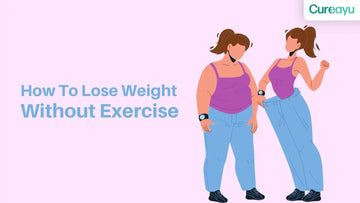Losing weight is often associated with strenuous workouts and intense physical activity, but not everyone has the time, ability, or inclination to exercise regularly. Whether due to medical reasons, a busy schedule, or personal preference, there are many who seek alternative methods to shed those extra pounds. Fortunately, weight loss without exercise is possible by focusing on dietary changes, lifestyle adjustments, and mindful habits. This approach not only aids in weight loss but also promotes overall well-being. By making thoughtful choices about what you eat, how you manage stress, and how you structure your daily routines, you can achieve your weight loss goals without hitting the gym.
Also Read: Best Exercise to Lose Belly Fat: Your Ultimate Guide to a Flat Stomach
Importance of Healthy Weight
- Improved Cardiovascular Health: Maintaining a healthy weight reduces the strain on your heart and lowers the risk of cardiovascular diseases such as hypertension, heart attacks, and strokes. Excess weight increases the workload on your heart, leading to higher blood pressure and cholesterol levels, which can result in serious heart conditions over time.
- Enhanced Mobility and Joint Health: Excess weight puts additional pressure on your joints, leading to pain and stiffness, particularly in the knees and hips. By achieving and maintaining a healthy weight, you can reduce this strain, improve your mobility, and lower the risk of developing conditions such as osteoarthritis.
- Better Respiratory Function: Carrying extra weight can impede your breathing and exacerbate conditions like sleep apnea and asthma. A healthy weight can improve lung function and make breathing easier, enhancing overall respiratory health and quality of sleep.
- Increased Energy Levels: Excess weight can lead to fatigue and reduced stamina. By shedding extra pounds, you can experience a significant boost in energy levels, making daily activities more manageable and enjoyable.
- Improved Mental Health: There is a strong correlation between weight and mental health. Achieving a healthy weight can improve self-esteem, reduce anxiety and depression, and enhance overall psychological well-being.
10 Weight Loss Tips Without Exercise
- Mindful Eating: Pay attention to what and when you eat. Avoid distractions like watching TV or using your phone during meals. Eating slowly and savoring each bite can help you recognize when you’re full, preventing overeating.
- Portion Control: Use smaller plates and bowls to control portion sizes. Eating smaller, more frequent meals throughout the day can help regulate your metabolism and prevent the urge to overeat.
- Hydration: Drink plenty of water throughout the day. Sometimes, our bodies confuse thirst with hunger. Staying hydrated can help control hunger pangs and reduce calorie intake.
- High-Protein Breakfast: Start your day with a high-protein breakfast. Protein helps you feel fuller for longer, reducing the likelihood of snacking later in the day. Eggs, Greek yogurt, and protein smoothies are great options.
- Increase Fiber Intake: Foods rich in fiber, such as fruits, vegetables, whole grains, and legumes, help you feel full longer. Fiber also aids digestion and can help prevent overeating.
- Cut Back on Sugary Drinks: Beverages like soda, sweetened coffee, and fruit juices are high in calories and sugar. Replacing them with water, herbal tea, or black coffee can significantly reduce your calorie intake.
- Healthy Snacking: Replace high-calorie snacks like chips and cookies with healthier options like nuts, seeds, fruits, and vegetables. These snacks are nutrient-dense and can keep you satisfied between meals.
- Get Enough Sleep: Lack of sleep can disrupt hormones that regulate hunger and appetite, leading to weight gain. Aim for 7-9 hours of quality sleep each night to support weight loss efforts.
- Reduce Stress: Chronic stress can lead to emotional eating and weight gain. Practice stress-relief techniques such as meditation, deep breathing exercises, or engaging in hobbies to keep stress levels in check.
- Limit Processed Foods: Processed foods are often high in unhealthy fats, sugars, and sodium. Opt for whole, unprocessed foods to ensure you’re getting the nutrients your body needs without the extra calories.
Also Read: Food for Digestion: Navigating Digestion with the Art of Food Selection for Gut Harmony
Why There Is Need To Reduce Weight
- Lower Risk of Chronic Diseases: Excess weight is a major risk factor for chronic diseases such as diabetes, heart disease, and certain cancers. Reducing weight can lower the risk and improve overall health outcomes.
- Enhanced Quality of Life: Achieving a healthy weight can improve your ability to perform everyday activities, reduce physical discomfort, and increase your overall enjoyment of life.
- Longer Lifespan: Studies have shown that maintaining a healthy weight can extend your lifespan by reducing the risk of life-threatening diseases and conditions.
- Economic Benefits: Managing weight can reduce healthcare costs associated with treating obesity-related conditions and improve productivity by reducing illness-related work absences.
- Social and Emotional Benefits: Weight loss can enhance self-confidence, improve social interactions, and lead to better mental health and emotional well-being.
Conclusion
Losing weight without exercise is not only possible but also effective with the right strategies. By focusing on mindful eating, portion control, hydration, and incorporating nutrient-dense foods into your diet, you can achieve significant weight loss. Additionally, prioritizing sleep, managing stress, and making healthy lifestyle choices play crucial roles in this journey. Remember, every small change contributes to your overall goal. Weight loss is a gradual process, and consistency is key. Embrace these tips, stay patient, and celebrate your progress along the way. With determination and the right approach, you can reach your weight loss goals and enjoy a healthier, happier life.












